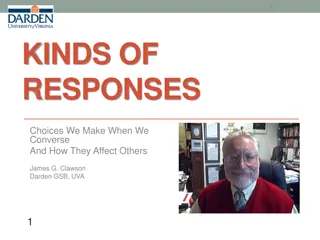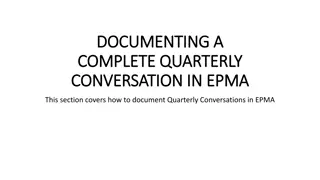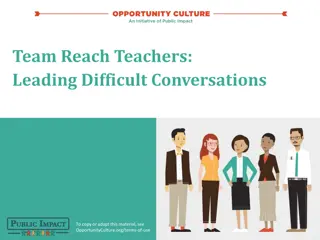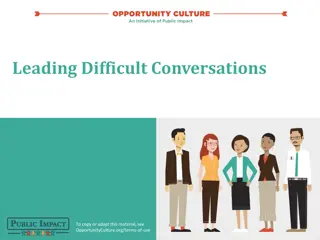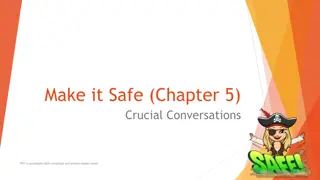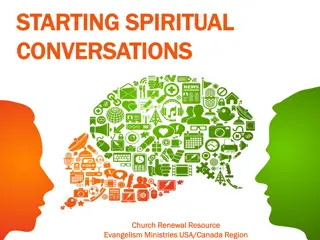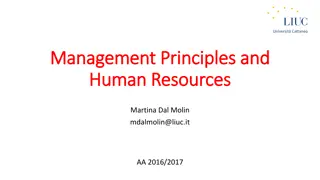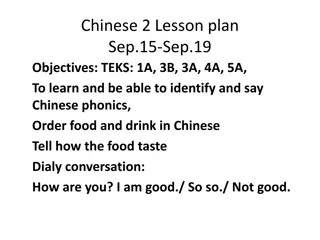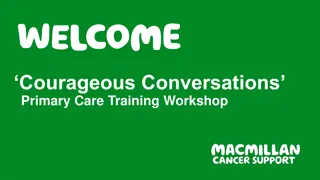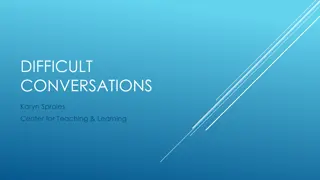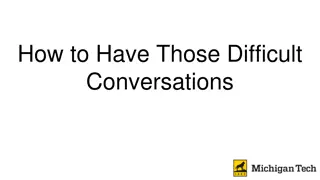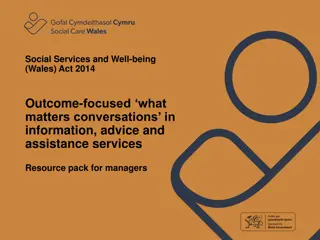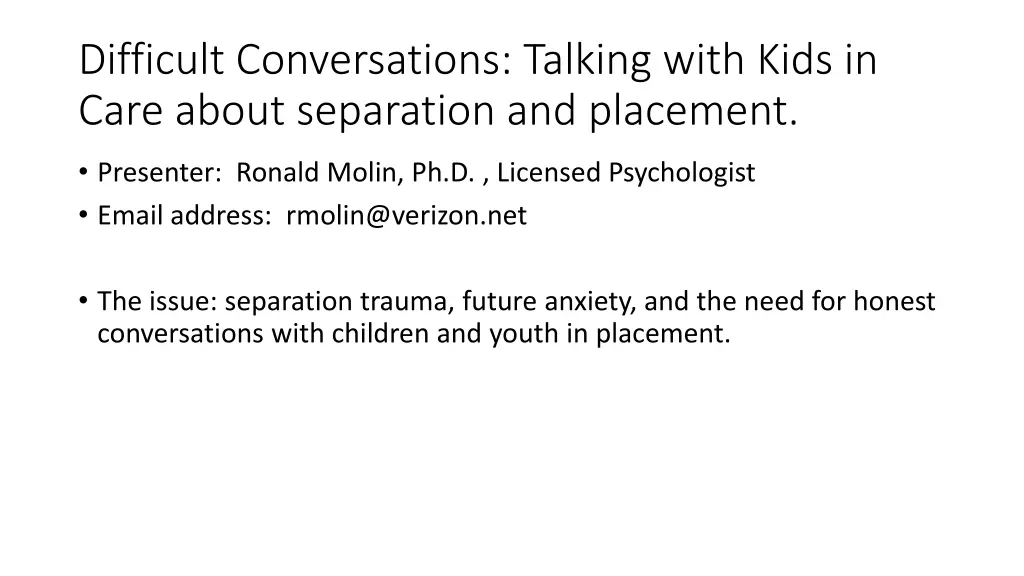
Helping Kids Understand Separation and Placement: Honest Conversations
Explore the importance of having open and honest conversations with children in care about separation trauma and placement. Learn from Ronald Molin, Ph.D., licensed psychologist, as he shares insights on addressing children's future anxieties through truthful dialogue. Understand the feedback from focus groups on the challenges and responsibilities faced by professionals in discussing these sensitive topics with children.
Download Presentation

Please find below an Image/Link to download the presentation.
The content on the website is provided AS IS for your information and personal use only. It may not be sold, licensed, or shared on other websites without obtaining consent from the author. If you encounter any issues during the download, it is possible that the publisher has removed the file from their server.
You are allowed to download the files provided on this website for personal or commercial use, subject to the condition that they are used lawfully. All files are the property of their respective owners.
The content on the website is provided AS IS for your information and personal use only. It may not be sold, licensed, or shared on other websites without obtaining consent from the author.
E N D
Presentation Transcript
Difficult Conversations: Talking with Kids in Care about separation and placement. Presenter: Ronald Molin, Ph.D. , Licensed Psychologist Email address: rmolin@verizon.net The issue: separation trauma, future anxiety, and the need for honest conversations with children and youth in placement.
What led me here today Director of Forensic Services at Children s Charter, a Division of Key, Inc. (20 years) Consulting Psychologist for DCF (too long to mention). Increasing experience with children who did not know why they were placed, or had been not given an honest account. Led to project with DCF Boston Regional Office to develop training for DCF staff on having difficult conversations. First step: focus groups with DCF staff, therapists, and Children s Attorneys.
Focus Group Feedback I: Attorneys had access to data on the children. But the kids often did not know or have correct information Older kids knew more, perhaps because adults were more willing to talk to them Did attorneys and mental health providers know what DCF told the child? Generally, no.
Focus group Feedback II: Therapists and attorneys believed children needed an account, but DCF responses were mixed, due to fears of distressing or retraumatizing the child. Who should tell them? No clear answer to this. Some DCF staff thought this was the responsibility of the attorney, attorneys thought it was the responsibility of DCF Therapists said they needed to know what had happened, but did not feel it was their role to disclose information, at least in this state (other states have different approaches). When to talk? All agreed this was a process, not a one-time event.
Focus Group Feedback III All agreed that Children were going to hear various accounts from different people. No account should be presented as an objective truth, but as a narrative for the child to consider. Explanations had to be consistent and supportive of the child s experience, e.g., a child should not be told that what happened did not happen, or that events should be rationalized or minimized. Should disclosures and conversations be documented in the child s record? Yes, they should.
Who else talks to kids about removal? Parents, despite being discouraged from doing so during visits. Parents may have talked to children about the risk of removal. Foster carers, who may not have full information, and may also be discouraged from discussion Siblings The concern about inappropriate conversation is real, but is there a cost to refusing to have such conversations?
Do children want to know? I did not run focus groups for children. Coram Voice, based in Great Britain, did. Their finding from 10,000 children in placement are consistent with other international studies (US lacks research). They found: Younger children (those aged 4 to 7) were more likely to be confused or unclear about why they were in care - half felt they hadn t had an explanation from an adult. Young people (aged 11-18) were more likely to feel they had received a satisfactory explanation but about a fifth were unsure or did not know. Boys were more likely to feel they knew enough. Analysis of the data showed that a lack of knowledge about the reasons for care was associated with feeling unsettled in placement and low subjective well-being for children in care (Staines and Selwyn, 2019). Young people who had left the care system continued to report that they had not had a full explanation about why they had been in care - nearly a quarter of care leavers (aged 18-25) surveyed through Bright Spots felt this way.
Participation in care Participation in care. Research, including systematic reviews of research and formal inquiries in different countries, has found that many children involved in child protection and family law matters have felt they were not being asked, listened to or heard, in some cases even regarding harmful and unsafe situations, (Cashmore, Long and McLaine, 2023) children who said they were given little, if any, information or were not asked for their views and did not have the chance to be involved in any important decisions felt frustrated, confused, powerless and angry (ACYP 2022) On the other hand children who felt that their views were considered by their caseworkers reported feeling a greater sense of empowerment and agency, as well as positive emotional well-being. (ACYP 2022)
What do Kids say about conversation and participation? Even if it s something really bad, I want to know, cos it s going to come out anyway, you cannot hide stuff from me forever, even if it s a year down the line, I m still gonna know, so you might as well tell me so I can get my head round it, instead of worrying about why you kept it from me, which would make me more frustrated. So I like to know everything, even if it s like bad, so that I can get over it. (Helena, aged 14). Make their opinions valid; make sure they actually listen to what children have to say. And do some things that they want to do, so they will take part (Daisy, aged 7). Quotes from: Race, T. & Frost, N. (2022) Hearing the Voice of the Child in Safeguarding Processes: Exploring Different Voices and Competing Narratives. Child Abuse Review, 31(6) https://doi.org/10.1002/car.2779
Are kids entitled to information and Are kids entitled to information and participation? participation? International Law: The U.N. convention on the Rights of the Child Article 12 1. States Parties shall assure to the child who is capable of forming his or her own views the right to express those views freely in all matters affecting the child, the views of the child being given due weight in accordance with the age and maturity of the child. 2. For this purpose, the child shall in particular be provided the opportunity to be heard in any judicial and administrative proceedings affecting the child, either directly, or through a representative or an appropriate body, in a manner consistent with the procedural rules of national law. Two countries have not ratified the convention: Somalia and the United States.
Foster Child Bill of Rights Not a national law, but some states have adopted it and others endorse it. Relevant here: Shall participate in the development and review of the service plan and have input into changes to the plan that affect permanence, safety, stability or well being. Youth age 14 and older should also be presented with the service plan for their review and signature. Shall be informed in a manner appropriate to age and level of understanding of the reason(s) the Department of Children and Families became involved with his/her family and why he/she is in care. Shall be included in the Foster Care Review meeting, Permanency Hearing and Lead Agency Team meeting if age 14 and older, unless documented by court order or service plan that participation would be detrimental to the youth. If the youth is unable to attend in person, he/she shall have the right to submit a written statement to be considered at the meeting.
What about in Massachusetts? https://www.mass.gov/doc/foster-child-rights-0/download Online you can find the full Bill of Rights, along with the following: The Department of Children and Families recognizes the following rights of children and youth in foster care. These rights are intended to guide the Department and its providers in the delivery of care and services to foster youth with the commitment to permanency, safety and well-being. This Bill of Rights was developed by the Department s Youth Advisory Board. This is the only mention of these rights I could find. DCF policy states that children over 14 years of age may attend meetings, and younger children could, if appropriate. There are no guidelines for determining when participation would be appropriate.
DCF Policy and Practice To my knowledge, there is no policy requiring disclosure or documenting conversations with children about why they were placed. There is no training on this issue. Participation: Children over age 14 have the right to attend foster care reviews. Younger children can attend if appropriate. There is no guidance to determine what is appropriate or how to conduct meetings if the child is present.
About Traumatic Separation About Traumatic Separation Separation trauma is tied to loss and anxiety. The key loss may not be to a parent. It may be to siblings, neighborhoods, friends, school, other connections to adults, possessions. If we don t know who knows us, our history, context, language, then we also lose our sense of identity. The anxiety may not be self-centered. It may be concern about whether a sibling, parent, or pet is OK. We don t know who is making decisions, or how, concerning us. We don t know what happens next and if this happens to other children. Ambiguous loss: You still have a family, but they are not with you. You can t mourn for a loss that no one names or recognizes. This loss is marked by absence and uncertainty.
Are all separations traumatizing? Are all separations traumatizing? A thought exercise. If you have children, think about a time they went to visit relatives, or had a school overnight trip or went to a sleepaway camp. Or remember your own experience. I hope this is not a distressing exercise. But if you survived, what helped make the experience tolerable? We can talk about how those experiences differ (or not) from entering foster placement. The same supports that help kids with normative separations are relevant here.
The cost of not sharing honestly: I The cost of not sharing honestly: I When we avoid an issue, the child learns that it can t be talked about. This is the issue with therapists waiting for a kid to bring up trauma The child does not know what we know, and what we don t know. Vague information leads to bad outcomes. A child was told their parent was sick and needed to get better Placement may confirm the message that the child is bad and this was their fault. A chance to normalize talking about distress and dealing with feelings is missed.
The cost of not sharing honestly: II The cost of not sharing honestly: II Not just lost in space, but lost in time, since they have no clarity about their future (future anxiety). Problematic behaviors in placement may be attributed to as a reaction to placement, or as sequelae to events in the home, but may be the child s way or reacting to ambiguity, or expressing their needs, about their future. This misattribution places the responsibility on the child, when it is a systems issue.
What if this is distressing? Skills for staff Remember the trauma has already happened Follow the child s cues for pacing and let them control how much to hear and say. Remind the child that this is a safe place and they are not in trouble Remember that children have defenses: they can deflect, distract, tune out, and these are age-appropriate reactions. There is a difference between protection from distress and being with someone in distress.
What if the child becomes dysregulated? For kids where this is an issue, you can plan with them about what they may want you to do if they are upset. The goal with dysregulation to to reestablish safety Lower expectations When we stay calm it helps children stay calm (Breathe).
Follow Follow- -Up for the child and for staff. Up for the child and for staff. We can let the child know that they may have thoughts and feelings after talking, that this is OK, and ask where they may get some help if they are upset. We can let the carer know that the child may have a hard time after the appointment. Having a reaction after an interview does not mean we did something wrong Staff should also have someone to talk to after a difficult conversation.
DCF and Participation in Decisions DCF and Participation in Decisions Guidance for staff is minimal. Children over 14 have the right to attend meetings. Under 14 is OK if appropriate. There is a bias towards protecting children from information that may upset them. Do you talk with children about whether they want to participate? Do you talk with DCF staff about how to have children participate? Can meetings be designed to accommodate children? Do you want to change how DCF deals with your clients in this area?
Mental Health Services Access to trauma-informed care is limited. Don t assume that inadequate care is better than nothing . There is a difference between informed consent and the right to be informed about one s treatment and to assent to care. Kids should have the opportunity to assent. You don t need to be a mental health expert to talk with a child about their understanding of why they are getting services and whether they find it helpful. Children in care at at risk of polypharmacy and overmedication.
Schools and participation Children in care are more likely to need Individual Educational Plans, which means regular assessments and yearly review meetings, more if they are changing schools during the year. There is no rule against children attending these meetings. Many will do better if their views and preferences are taken into account.
What next? What is your agency s policy, practice, and culture regarding honest conversations with children in care? Should you assess how staff respond to this issue and what their needs may be? There is a larger issue regarding collaboration and practice across systems, especially given the central role of DCF and its responsibility towards children in care. I advocate that change needed in DCF s practice and priorities. If I can be a resource either to CLM or to your agency, please contact me. (rmolin@Verizon.net) There is a list of references and resources on this topic.
Recommendations Support the Foster Child Bill of Rights DCF should train and support staff in having difficult conversations Sharing of information with children entering care should be documented in the case records and updated regularly This information should be shared with care providers as appropriate, and traumatic separation should be assessed and responded to. Both parents and children need support in dealing with traumatic separation. Avoidance is not trauma-informed care.

